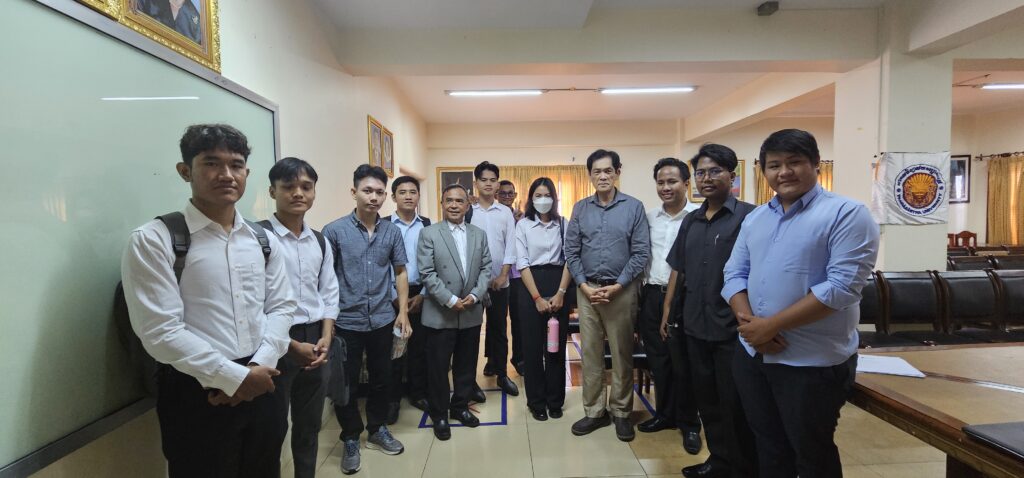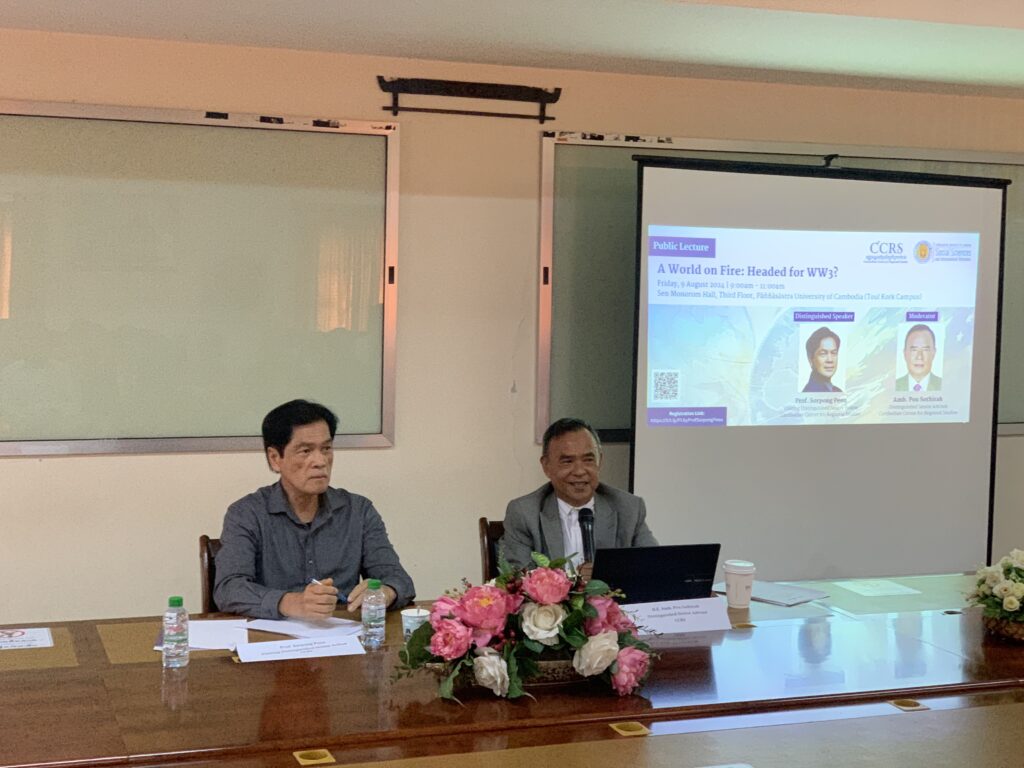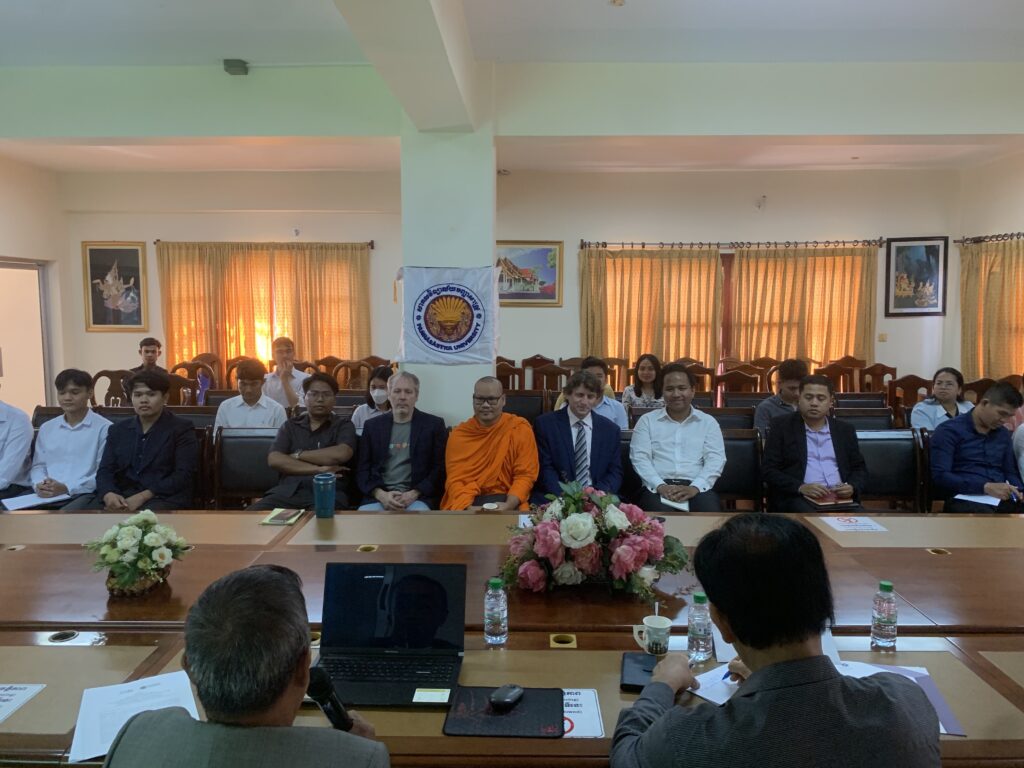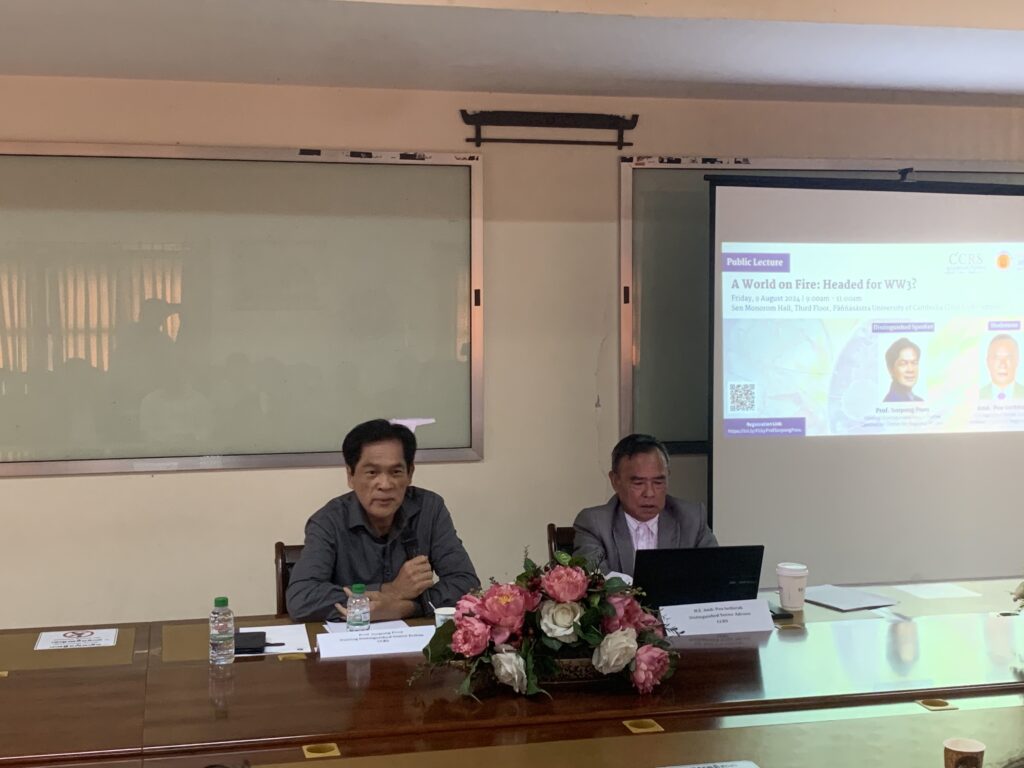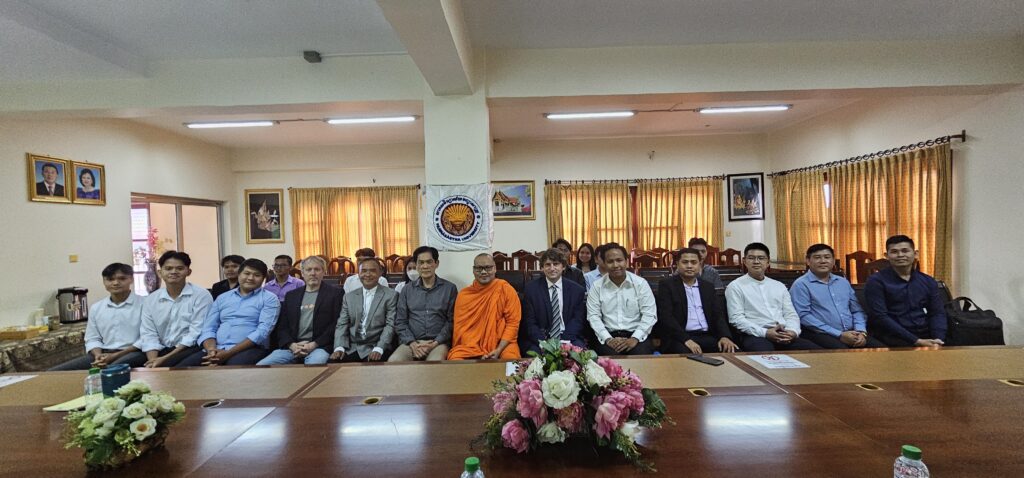On 9 August 2024, from 9-11am, at the PUC’s Toul Kork, CCRS organized a public lecture on “A World on Fire: Headed for WW3?” by Distinguished Speaker, Prof. Sorpong Peou, Visiting Distinguished Senior Fellow, CCRS. The event is supported by the PUC’s Faculty of Social Sciences and International Relations.
After thanking all participants, Amb. Pou Sothirak provided a scene setting statement to kick start this important lecture. With global and regional power competitions are heating up, it is easy to understand why many consider the world in on fire with a possibility of the eruption of the WW3. It is with this context that this lecture by an acclaimed scholar, Dr. Sorpong Peou, Professor in the Department of Political and Public Administration of Toranto Metropolitan University is organized by CCRS to help IR students gain deeper understanding the deteriorating nature of the international system that will impact security and stability, disrupting hard earned peace and prosperity in a new and multipolar world. He called on all students attending this lecture to pay serious attention during Prof. Sorpong Peou’s presentation.
During start up, Prof. Sorpong Peou impressed all students on his personal view of being an ideal academic. As a humble scholar, one should be satisfied if only 50% of the participants agree with his or her presentation. If 60% agreed with the view expressed, the scholar would of course feel better. However, if 75% agreed, the speaker may feel he or she has become a dangerous scholar. And if 100% agreed, that scholar has become a lunatic. As a humble scholar, Prof. Sorpong Peou is eager to learn from the students’ responses and reactions to his presentation and he would feel good if the students challenge his views.
The center piece of Prof. Sorpong Peou’s lecture was around the prediction that the world is heading toward World War 3 and if one breaks out, it will not be in Asia nor in Russia, but rather in the Middle East.
He argued that Asia and Europe do not possess sufficient lethal flashpoints to spark one global conflict that would quickly escalate to war. But if one breaks out, this world war will erupt in the Middel East. He believes that all countries in the Indo-Pacific would not go to war due to their wide-ranging interdependencies and there are solid democratic institutions that prevent them to go to war with each other. However, there is emerging a preponderant of collective non democratic powers that converge around the raging Israel-Palestine conflicts which are being fought as a big bang that could draw in the US, China, Russia, Iran and other European powers to support their respective allies. Already, Israel is at war with Hamas in Gaza and the aggressive Iranian retaliation on Israel could spark a wider regional conflict and potentially ignite into full scall WW3. The potential risk of war breakout in the Middle East is greater than those driven from tensions and conflict in the South China Sea or Ukraine War. China and Russia are less likely to go to war with the United States.
He pointed out that WW3 will not happen in the immediate future but remain probable because the current world order is rampant with increasing tensions and conflicts with regional and global ramifications. The biggest elephant in the room is the rivalries between the US and China. Flashpoints such as war in Ukraine, crisis in the Middle East, South/East China Sea Disputes, North Korea’s nuclear weapons, Cross Strait relations could provoke miscalculations and mistrust which potentially lead to global conflicts and ultimately to another world war.
He also argued that any global war will not be likely to start in Asia, because the Indo-Pacific is an economic interdependent region with multilateral cooperation based on well-founded institutions, much better than in the Middle East. Moreover, the Asia’s rising power, China is in the state of managing its growth trajectory in light of growing geopolitical, security, military, economic, and demographic challenges, internally and externally. China also has difficulties in securing strong allies to be on its side. In addition, the US along with its alliance system remain a powerful security balancer in Asia. China is, therefore, unlikely to be able to change this status quo in the foreseeable future. However, accidents and incidents due to miscalculations over issues like Taiwan and South China Sea might emerge unexpectedly that could escalate to become a huge global conflict.
Any world war will be likely to be escalated in the Middle East. Economically and institutionally, the Middle East is not well-integrated region. The region is full of mistrust due to long historical animosity and conflicts, deep involvement of extra-regional powers, insecurity dynamics, and absence of effective regional institutions to keep those tensions and conflicts in check. For example, following the attack of 7th October 2023, the conflict between Hamas and Israel has quickly been transformed a global scale conflict that also involves the US, China, Russia, major European countries, and Iran. As this case shows, the sparks of conflicts in the Middle East are prone to being flared up to become a major global conflict.
During the Q&A session, there were lively discussions between the distinguished speaker and the participants over key questions such as how states in Southeast Asia can navigate US-China rivalry and cope with growing international tensions more effectively? What is the future of the US and China rivalry? How stable is the US’ commitment to the region? And what are the implications of the US’ presidential election this November? Prof. Sorpong Peou provided insightful answers satisfactory to all questions put forward to him by the Cambodian university students.
Key takeaways from Prof. Sorpong Peou include:
ASEAN cannot start the war – no one in ASEAN wants the war.
Turkey, Iran, and Pakistan are not interdependent economically and less developed institutionally as they are considered non-democratic, but they are capable of instigating big bangs in Middle East that could cause world war due to their nuclear capability.
Russia cannot risk its invasion in Ukraine into a full-blown war with NATO and the US. Russia troops can’t move beyond Eastern Ukraine.
NATO containing of Russia is different than how Southeast Asia see China wields influence in the region. China is seen as more of a benign power with no intentions to instigate regime changes and no interferences in internal affairs. However, China is quite annoyed with US-led Indo-Pacific Strategy which views China as a threat to the US national security.
The trajectory of rising China is now less convincing due to internal economic difficulties and ongoing US-China trade war. Although China can maintain economic stability, peace and order, but its authoritarian regime will not be sustainable in the long run because new ideas cannot emerge as the country’s elites always hold on to ‘my ideas are best’.
Although in the SCS, China is a threatening force but Beijing will not risk going to war with the US. China will not go to war with the US over the prospect of invading Taiwan neither.
Cambodia as a small state should be on the right side of history and make a right decision. The country should take necessary cautionary measures in aligning itself with any powers and assessing carefully its relationships with those powers to strike a balance relationship with them to safeguard peace, stability and prosperity while enhancing Cambodia’s national strategic interests.
CCRS would like to express our appreciation to the distinguished speaker, Prof. Sorpong Peou, and the moderator, Amb. Pou Sothirak for the insightful and interactive public lecture. Our thanks also go the PUC’s Faculty of Social Sciences and International Relations for the support for our event. All CCRS researchers and students who attended the lecture have learned a lot from Prof. Sorpong Peou’s interesting lecture.
